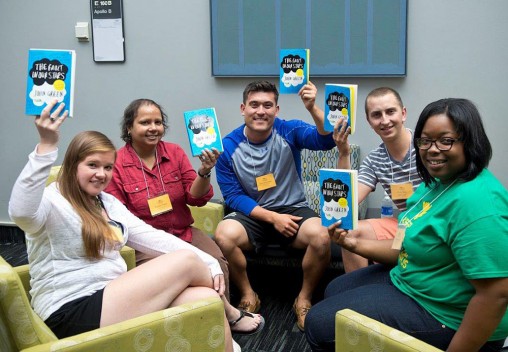
Wright State student peer mentors for this year's Common Text are (from left) Kate Grim, Pratibha Nigam, Jason Moorman, Cody Butz and Courtney Jones.
It grabs you from the very first sentence:
Late in the winter of my seventeenth year, my mother decided I was depressed, presumably because I rarely left the house, spent quite a lot of time in bed, read the same book over and over, ate infrequently, and devoted quite a bit of my abundant free time to thinking about death.
And then “The Fault in Our Stars” by John Green takes you by the throat and whips you around like a rag doll. It is dark. It is light. It is painful. It is funny. It is tragic. It is hopeful.
And it is this year’s Common Text at Wright State University, with plans for use in many first-year courses.
“The main goal of it is to give students as they are coming in to college a shared academic topic or discussion point so they all have something in common they can discuss,” said Maureen Barry, librarian at Wright State’s Dunbar Library and member of the Common Text committee.
The book is a runaway train. Two young cancer victims falling deeply in love while trying to protect each other from a monster that will destroy one by taking the other.
I wanted to know that he would be okay if I died. I wanted to not be a grenade, to not be a malevolent force in the lives of people I loved.
The first Common Text at Wright State was selected for the 2003–04 school year. The books are distributed during Orientation, with nearly 2,500 copies being handed out this summer.
One incoming student tweeted: “Wright State just gave all of the students at orientation a copy of ‘The Fault in Our Stars.’ I’m basically in love with this school.”
The story feels honest — the world as seen through a cancer-patient prism most of us never see.
“The world,” he said, “is not a wish-granting factory,” and then he broke down, for just one moment, his sob roaring impotent like a clap of thunder unaccompanied by lightning, the terrible ferocity that amateurs in the field of suffering might mistake for weakness.
Barry said Green wanted to convey the message that lives can be meaningful even if they are short.
“These are very young folks going through some very difficult life circumstances, trying to make their lives mean something,” she said. “I really love the book. I fell in love with the characters. I couldn’t put it down.”
There are catastrophic breakups, with streams of tears staining a black T-shirt. There are phone calls under the dome of a starry night. There are awkward hospital visits. There’s Shakespeare, Swedish hip-hop music and the egging of an ex-girlfriend’s car.
The committee that recommends the Common Text consists of about 20 representatives from Wright State colleges, the student body, staff, Honors Program, the library, service-learning and Disability Services.
The panel comes up with a pool of 20 to 25 books by seeking nominations from the university community and from an annual conference on the first-year college experience. The pool is narrowed to about a dozen books, which are read by the committee before being narrowed down to three or four.
After a university-wide survey, the committee makes its final recommendation to Thomas Sudkamp, vice president for curriculum and instruction, who makes the final selection.
In “The Fault in Our Stars,” there are heart-pounding confessions and heart-stopping diagnoses — life-changing, life-ending stuff.
“That’s the thing about pain,” August said, and then glanced back at me. “It demands to be felt.”
The Common Text must have a theme that resonates with first-year students, must be applicable in a wide variety of courses and must be able to be connected to service-learning opportunities.
Common Text-related events planned for this year include a Twitter chat, a panel discussion with alumni writers, an art competition and a contest.
“The Fault in Our Stars” ends with a heart-wrenching jolt and hard-won wisdom.
I am so lucky to love her, Van Houton. You don’t get to choose if you get hurt in this world, old man, but you do have some say in who hurts you.

 Walking through open doors
Walking through open doors  Adventures await
Adventures await  Wright State to expand nursing facilities to meet workforce needs and prepare more graduates for in-demand careers
Wright State to expand nursing facilities to meet workforce needs and prepare more graduates for in-demand careers  Wright State student-athletes make a lasting impact on local family with more to come
Wright State student-athletes make a lasting impact on local family with more to come  Wright State names Rajneesh Suri dean of Raj Soin College of Business
Wright State names Rajneesh Suri dean of Raj Soin College of Business 